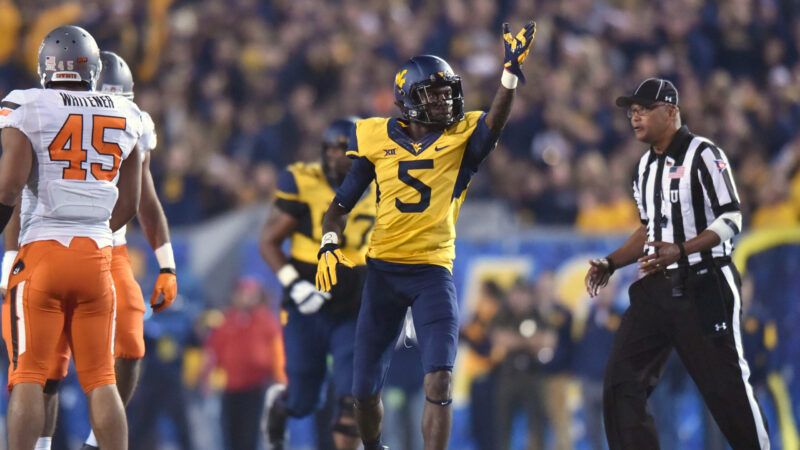NCAA Can't Ban Colleges From Compensating Athletes, Supreme Court Says
"The NCAA is not above the law," wrote Justice Brett Kavanaugh in a fiery concurring opinion.

The Supreme Court has delivered a unanimous smackdown to the National Collegiate Athletic Association (NCAA) for its rules banning schools from compensating college athletes.
The court's unanimous ruling today in NCAA v. Alston is actually a relatively narrow one that deals only with whether schools can give student-athletes education-related benefits, such as providing free laptops or access to internships as a condition of playing sports. But the case seems likely to throw open the doors to a broader challenge to the NCAA's requirement that student-athletes be unpaid amateurs. In a fiery concurring opinion, Justice Brett Kavanaugh outlined how that next step might go—and it doesn't look great for the NCAA.
"The NCAA's business model would be flatly illegal in almost any other industry in America," wrote Kavanaugh, a former college basketball player. "Nowhere else in America can businesses get away with agreeing not to pay their workers a fair market rate on the theory that their product is defined by not paying their workers a fair market rate."
For example, Kavanaugh wrote, restaurants could not agree to refuse to pay their cooks under the theory that consumers would prefer to eat food prepared by amateur chefs. Likewise, law firms would not be allowed to ban compensation for their attorneys under the premise that lawyers were working "out of a 'love of the law.'" But this exactly what the NCAA has long argued: that even giving college athletes the most minimal of compensation for their efforts would somehow sully the games that the NCAA earns big bucks by marketing to television.
"The NCAA is not above the law," Kavanaugh concluded.
NCAA v. Alston originated back in 2014, when Shawne Alston, a University of West Virginia football player, and dozens of other former Division I college football and basketball players sued over the "interconnected set of NCAA rules that limit the compensation they may receive in exchange for their athletic services." This case dealt exclusively with education-based benefits that could be given to student-athletes, but other lawsuits have also targeted the NCAA's limitation on paying athletes for the use of their names, images, and likenesses in officially licensed NCAA products, including jersey sales and video games. Several states have already passed laws carving away at the NCAA's ban on giving athletes a share of the revenue derived from the use of their likenesses, and the NCAA indicated last year that it is reading the room and might change its policy.
So Monday's ruling did not happen in a vacuum. It is part of an ongoing trend of legal and legislative defeats for the NCAA's unpaid-amateurs mandate.
"Even though the decision does not directly address name, image, and likeness, the NCAA remains committed to supporting [such] benefits for student-athletes," NCAA president Mark Emmert declared in a statement on Monday. "Additionally, we remain committed to working with Congress to chart a path forward, which is a point the Supreme Court expressly stated in its ruling."
This ruling may end up having parallels to the Supreme Court's 1985 ruling in NCAA v. Board of Regents of Oklahoma University. That decision struck down, on antitrust grounds, the NCAA's policy that only it could negotiate deals with television networks seeking to broadcast college sports. In the wake of that decision, schools and college athletic conferences were able to negotiate their own television deals—and, as you might expect, the result was a lot more college sports on TV and a lot more television revenue for schools and conferences.
That case effectively collapsed the NCAA's exclusive ability to artificially restrict the compensation that schools could earn from sports. The new ruling similarly collapses (or at least severely curtails) the NCAA's exclusive ability to artificially restrict the compensation that athletes receive for playing sports.
Kavanaugh's concurrence invites future litigation that will get to the heart of the NCAA's prohibitions on compensating student-athletes, says Ilya Shapiro, director of the center for constitutional studies at the Cato Institue, a libertarian think tank.
"Today's case likely ushers in compensation of 'amateur' athletes in all but name," Shapiro writes.
The NCAA seems to realize as much. When asking the Supreme Court to review the NCAA v. Alston case, the NCAA argued that the lower court's ruling in Alston's favor "will fundamentally transform the century-old institution of NCAA sports, blurring the traditional line between college and professional athletes" if allowed to stand.
Today, the Supreme Court unanimously affirmed it. Tradition has its place, but it is a terrible justification for refusing to pay your workforce.


Show Comments (74)